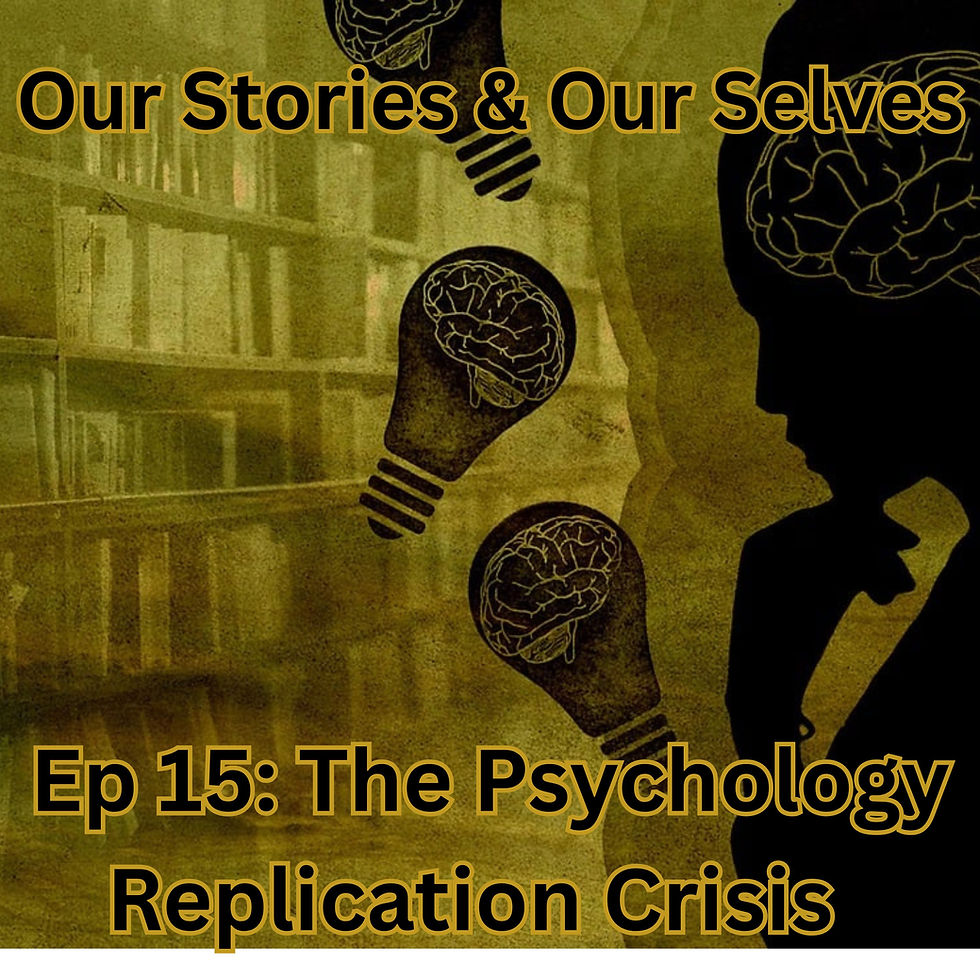Episode 7: Stories about Shakespeare
- Our Stories and Our Selves
- Jun 9, 2025
- 2 min read
(apologies, I prepared this but failed to actually post it when the episode went live two weeks ago!)
Shakespeare is one of the most famous writers, in English, of all time. Stories abound about who he was and what he achieved, but what is the truth of them? What do these stories tell us about the time he lived in, and the things which have happened since then? This episode explores the stories about Shakespeare, and how they affect how we think about literature and language.
Get in touch on OurStoriesAndOurSelves@gmail.com or @ourstories.bsky.social
Music from: https://pixabay.com/users/good_b_music-22836301/
Image by: <a href="https://pixabay.com/users/samueles-1246195/?utm_source=link-attribution&utm_medium=referral&utm_campaign=image&utm_content=2984316">Samuele Schirò</a> from <a href="https://pixabay.com//?utm_source=link-attribution&utm_medium=referral&utm_campaign=image&utm_content=2984316">Pixabay</a>
Sources:
10 Words Shakespeare Never Invented. (n.d.). Retrieved 2 May 2025, from https://www.merriam-webster.com/wordplay/words-shakespeare-didnt-invent
Cole, H. C. (1983). Shakespeare’s Comedies and their Sources: Some Biographical and Artistic Inferences. Shakespeare Quarterly, 34(4), 405–419. https://doi.org/10.2307/286985
Elizabethan Cost of Living, Salary, Costs. (n.d.). Elizabethan Era. Retrieved 3 May 2025, from https://elizabethanenglandlife.com/elizabethan-cost-of-living.html
Fox, A. (2000). Oral and Literate Culture in England 1500-1700. Clarendon Press.
Grady, C. (2016, April 22).
Why some people think Shakespeare didn’t write Shakespeare, explained. Vox. https://www.vox.com/2016/4/22/11480192/shakepeare-400-anti-stratfordian-authorship-controversy
Greene’s Groats-Worth of Wit. (2024). In Wikipedia. https://en.wikipedia.org/w/index.php?title=Greene%27s_Groats-Worth_of_Wit&oldid=1212687471
Historical city travel guide: London, late 16th century | British Museum. (n.d.). Retrieved 2 May 2025, from https://www.britishmuseum.org/blog/historical-city-travel-guide-london-late-16th-century
Keenan, S. (2002). Travelling Players in Shakespeare’s England. Palgrave Macmillan.
Leveen, L. (2014, October 28). The Balcony Scene in ‘Romeo and Juliet’ Is a Lie. The Atlantic. https://www.theatlantic.com/entertainment/archive/2014/10/romeo-and-juliets-balcony-scene-doesnt-exist/381969/
McDaniel, S. (2018, January 3). Debunking Common Myths and Misconceptions about William Shakespeare. Tales of Times Forgotten. https://talesoftimesforgotten.com/2018/01/03/the-bard-you-know-common-myths-and-misconceptions-about-william-shakespeare/
Mowat, B., & Werstine, P. (n.d.). Shakespeare’s Life: From the Folger Shakespeare Editions | Folger Shakespeare Library. Retrieved 2 May 2025, from https://www.folger.edu/explore/shakespeares-works/shakespeares-life-from-the-folger-shakespeare-editions/
Printing press. (2025). In Wikipedia. https://en.wikipedia.org/w/index.php?title=Printing_press&oldid=1284911507
Shakespeare Myths… Exposed & Debunked! (2015, June 5). No Sweat Shakespeare. https://nosweatshakespeare.com/shakespeare-myths/
Shakespeare’s Collaborations. (n.d.). Shakespeare Birthplace Trust. Retrieved 3 May 2025, from https://www.shakespeare.org.uk/explore-shakespeare/podcasts/60-minutes-shakespeare/shakespeares-collaborations/
Shakespeare’s life | Folger Shakespeare Library. (n.d.). Retrieved 2 May 2025, from https://www.folger.edu/explore/shakespeares-life/
Shakespeare’s Manipulation of His Sources in As You Like It on JSTOR. (n.d.). Retrieved 2 May 2025, from https://www.jstor.org/stable/2915010?searchText=shakespeare+sources&searchUri=%2Faction%2FdoBasicSearch%3FQuery%3Dshakespeare%2Bsources%26so%3Drel&ab_segments=0%2Fbasic_search_gsv2%2Fcontrol&refreqid=fastly-default%3Aecd4a33965e2d30a072783152dfbf93b&seq=1
Shakespeare’s Words. (n.d.). Shakespeare Birthplace Trust. Retrieved 3 May 2025, from https://www.shakespeare.org.uk/explore-shakespeare/shakespedia/shakespeares-words/
Stone, P. (2014, September 19). The Port of London in the Tudor period | The History of London—Page 3. https://www.thehistoryoflondon.co.uk/the-port-of-london-in-the-tudor-period/
Taylor, G. (1995). Shakespeare and Others: The Authorship of ‘Henry the Sixth, Part One’. Medieval & Renaissance Drama in England, 7, 145–205.
Taylor, G. (2014). Why Did Shakespeare Collaborate? In P. Holland (Ed.), Shakespeare Survey (1st ed., pp. 1–17). Cambridge University Press. https://doi.org/10.1017/SSO9781107775572.001
The pen is mightier than the sword. (2025). In Wikipedia. https://en.wikipedia.org/w/index.php?title=The_pen_is_mightier_than_the_sword&oldid=1281944726
Upstart Crow. (2025). In Wikipedia. https://en.wikipedia.org/w/index.php?title=Upstart_Crow&oldid=1283565691
Why Were Plays Banned in London in 1642? (n.d.). History Hit. Retrieved 2 May 2025, from https://www.historyhit.com/culture/1642-banning-londons-plays/


Comments